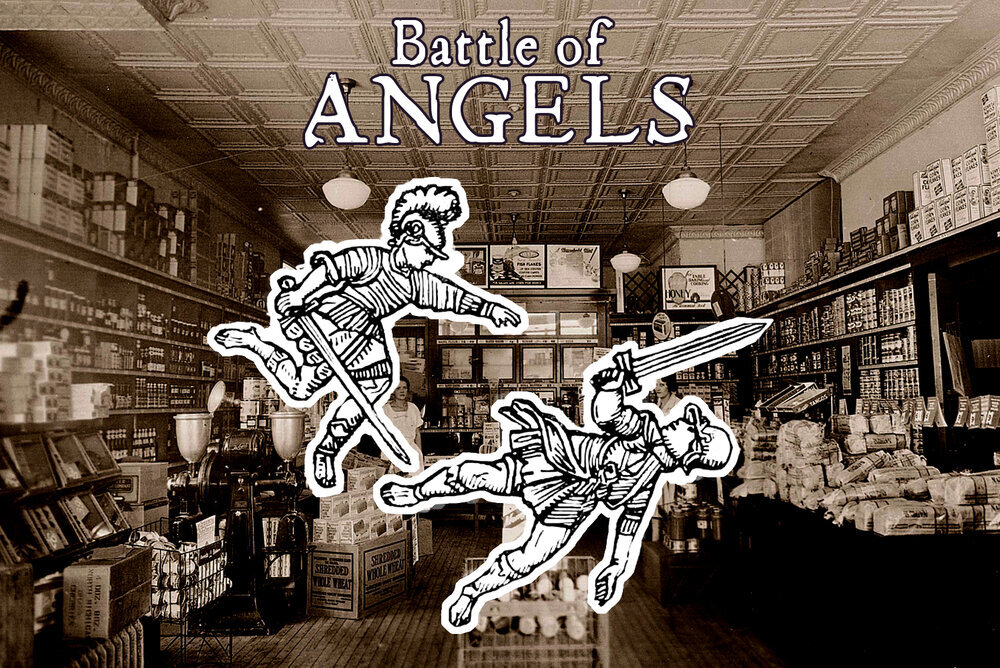
Festival 2021
Tennessee Williams & Censorship
Our 2021 Festival celebrated the 400th anniversary of the Puritans’ departure from Provincetown.
“In thinking it over, the Mayflower leaving is what defines Provincetown, so any attempt to find continuity with the Puritans is a fantasy,” says Festival curator David Kaplan.
“Using the same facts, it is possible — and desirable — to create another fantasy that predicts not the Constitution, but the work of Tennessee Williams and other wayward writers, including the provocations of Mae West, Penny Arcade, and any other future ‘flaunting’ we might imagine.”
Battle of Angels
Tennessee Williams
A morality play
Three women fight over a handsome stranger newly arrived in their Mississippi Delta small town. Written in 1940, Battle of Angels was closed by order of the Boston League of Decency.
The Demolition Downtown
Tennessee Williams
A suburban drama
A suburban family shuts themselves up as explosions rock the capitol. Can the revolution be ignored?
The Municipal Abattoir
Tennessee Williams
A thriller on a dune
From Nazi Germany, to a factory in St. Louis, to the Viet Nam War, Williams considered the ways in which someone would agree to be destroyed for the good of the State.
Why Did Desdemona Love the Moor?
Tennessee Williams
A love story
A Black screenwriter has a secret affair with a white movie goddess. Williams abandoned the project after 75 manuscript pages.
Sex
Mae West
A titillating comedy
Mae West’s first play was shut down for obscenity and got her thrown into jail for 10 days. Until then Sex was the best-selling play of the 1926 Broadway season, running 10 months. Most of the police waiting to escort Mae to the clinker had already seen the show.
The laws enacted to censor her in New York and Hollywood were used years later to censor Tennessee Williams.
The Mahagonny Songspiel
Bertolt Brecht, Kurt Weill, and Elisabeth Hauptmann
Agit-prop
Hitler’s thugs blew whistles at the 1927 premiere of this chamber opera. Communists in the audience blew whistles of their own. We’ll be handing out whistles in Provincetown.
Longing Lasts Longer
Penny Arcade
A rock ‘n’ roll manifesto
Since her stint at the Sacred Heart Academy for Wayward Girls, Penny Arcade has been unapologetically honest throughout her six-decade career of incisive avant-garde performance.
Her willingness to speak truth to power at the expense of career concerns has made her an international icon of artistic resistance.
The Witch
Thomas Middleton
A Jacobean outrage in the woods
Written in 1616, but not published until 1728. Why? English Puritans likely played a part. This retelling adds to the play’s laundry list of indiscretions with its all-female secret performance in the woods.
Puritan women! Dressing as men! Performing plays! In the woods! — It’s unheard of!
Cut Blanche
An interactive performance-lecture with former Festival Executive Director Jef Hall-Flavin, compares rare footage of cuts from the 1951 film of A Streetcar Named Desire with live performance of text from the 1948 stage play of Streetcar. Ruby Wolf, known to Festival audiences from Hall-Flavin’s 2015 production of Williams’ The Parade, plays Blanche Dubois.
Tennessee’s Latest Peep Show
This lagniappe acts out the accusation of critic George Jean Nathan that Williams' work was a series of peep shows. Slipping out of her negligee and straight jacket, Lefty Lucy, Miss Coney Island USA 2011, offers a bump and grind response to censorship.
Who Can Say What To Whom?
Penny Arcade, along with her longtime creative partner Steve Zehentner, develop their newest work with input from a live audience. As calls for silencing expression grow, Penny has been focusing her thoughts about censorship as self-righteousness. Become a part of the creative process as the project moves from page to stage.












